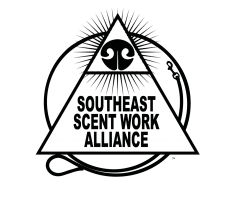Warning: The risk of addiction is “real”, if you read further.
Our dog’s noses are a highly evolved resource that has been under constant development for thousands of years. The ancestors of your favorite pet relied on superior olfaction to avoid disaster, find mates and keep food in their bellies. In other words, noses were their number one tool for exploring, solving problems and understanding their environment. In other, other words, every dog is a “sniffin’ machine”! Ancient canines depended on their unique adaptations for their very survival. The stakes are not so high for today’s companion dog, but sniffing is still “job one” for any canine. Olfactory ability in dogs is 10,000 to 100,000 times more sensitive than that of humans, say the experts. It should come as no surprise that humans learned quite a long time ago that letting canines do the work our noses can’t handle is a very good investment of time and effort. That understanding forms the fundamental basis of scent work.
As ancient predators, canines also developed exceptional problem-solving skills. Paired with their passion for sniffing and the guidance of human partners, scent work makes canines an invaluable resource for the detection of everything from lost people to illicit drugs and explosives. Trained dogs can even detect life threatening human illnesses, including cancer, diabetes, and even coronavirus infections. For humans that’s a great deal, but it’s also a great deal for the doggies.
Scent training provides beneficial physical and mental stimulation for dogs, encouraging them to burn off excess energy, utilizing their problem-solving brains together with their nose as a dynamic duo of detection. The effect of all that “work” is the fulfillment of ancient drives as well as a calming catharsis for your canine. It’s like having the most fun job in the world, doing what you do best.
Now, as important as working scent dogs can be for human health and safety, scent work isn’t just for working dogs. Any dog, from pets to pros, can reap the aforementioned benefits of scent work. And you don’t have to search for bombs to get in on the fun. Scent work teamwork is dream-work for any dog/handler combo.
That’s Where SSWA Comes Into Play
Organizations like SSWA host scent work competitions. The rules are governed by sanctioning bodies such as the AKC and NACSW, with more coming on the scene every year.
While scent work training is based on the same techniques and principles used for working dogs, the standards for participation in our competitions are not nearly as stringent. Getting started is easy and prior obedience training is not usually required. Scent work is a sport designed to include any dog, no matter the breed, age, gender, disposition, or size. And, we might add, dogs with disabilities can participate successfully in canine scent work. Blind dogs, amputees and even partially paralyzed dogs do it remarkably well.
So, Where Do I Start?
Working dogs typically undergo rigorous training and accreditation. It doesn’t have to be that way for our pets. As a pet parent, you can readily find expert trainers who will help you and your dog learn how to detect scents for fun or sport. Typically, dogs start out by searching for either a favorite toy or food reward, hidden in increasingly challenging environments. New challenges and skills are layered on as the dog and handler team make progress. After mastering the basics, the target transitions to a scent, paired with food or toy, and eventually to scent only. In theory, the scent could be anything, but in competitions, such as the ones SSWA hosts, the unique scents are birch, anise, and clove essential oils. When the dog finds the exact source of the hidden scent and communicates this to their handler, a tasty treat or favorite toy rewards them and reinforces the lesson. After that, it’s just a matter of practice and speed.
Because competitive scent work is a team sport, the dynamics of dog/handler interaction and communication may well play a greater role than a dog’s breed and whether is comes from a “working line”. Performance variables in the sport are numerous and complex. Breed is one consideration, out of many, and doesn’t necessarily correlate with competitive success for the team. The privilege of engaging in a partnership with your dog, doing something your dog truly enjoys and something you will enjoy, is what makes training and competing in scent work such tremendous fun. Perhaps, you and your dog should consider giving it a try?
